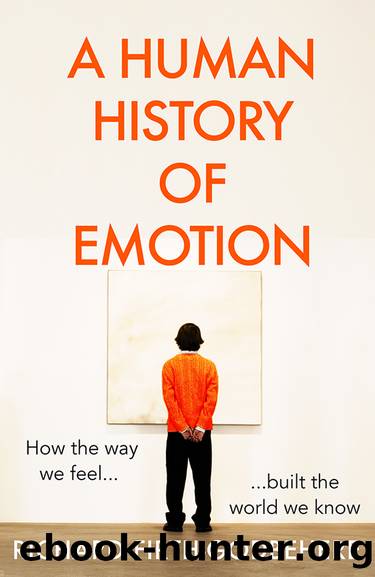A Human History of Emotion by Richard Firth-Godbehere

Author:Richard Firth-Godbehere [Firth-Godbehere, Richard]
Language: eng
Format: epub
Publisher: HarperCollins Publishers
Published: 2021-10-11T12:00:00+00:00
This poem was composed by the Japanese Buddhist monk Jakuren, who died in 1202. Here, Jakuren is dissolving his personal loneliness into the world around him. But he isnât really alone; he is surrounded by the beauty of the mountains and the setting sun. Mono no aware is a path to nirvana that doesnât require the expulsion of all feelings: instead, you understand how those feelings relate to the world around you. You use them to dissolve into the emptiness of the universe. Become one with it. Realize how the way you feel interacts with the illusion that is the world.
But what does that have to do with haji? In the case of Japanese Buddhism, haji occurs when people see you in a way youâd rather they didnât, when their knowledge of something youâd rather keep hidden makes it impossible for you to dissolve neatly into the void. You might call this a sort of attunement disruption.
A Japanese form of dance-drama known as Noh might help to illustrate the point. In one such drama, called Eguchi, two characters, a monk and an asobiâa member of a group of wandering dancers once associated with prostitution but later a quasi-order of Buddhist nunsâare speaking to each other. At this time in Japanese history, sex work was thought of as a source of great haji. The monk recognizes the asobi and remembers when she was a sex worker. He recites a poem asking her for âlodgingsâ and ârefuge.â (Iâm sure itâs not too hard to work out what âlodgingsâ and ârefugeâ mean in this context. He wasnât just asking for a bed to sleep in overnight.) She, of course, refuses and is overcome with haji.[10] Being reminded of who she once was is a source of shame for the asobi. More powerfully, itâs the haji born from the monkâs ability to remind her of a past actual self that brought feelings of shame when contrasted with her ideal self, which she was striving toward.
Historian Gary Ebersole has pointed out that the asobiâs haji is a lot like the shame Izanami felt when her husband saw her corpse: âThe emotion of shame is produced in a character when someone views her in a way that does not match her own sense of identity or her public self-presentation.â[11] You become fearful that someone knows something about you that you want to keep hiddenâfor example, that you are decomposing or used to work in a profession thought of as taboo. According to linguist Gian Marco Farese, the fear of people finding out something youâd rather they didnât is a central part of haji, even today.[12] In a religion whose goal is to evaporate out of a world thought of as an illusion, haji had the power to make everything feel mighty real.
Download
This site does not store any files on its server. We only index and link to content provided by other sites. Please contact the content providers to delete copyright contents if any and email us, we'll remove relevant links or contents immediately.
Spare by Prince Harry The Duke of Sussex(4203)
Machine Learning at Scale with H2O by Gregory Keys | David Whiting(2295)
Fairy Tale by Stephen King(2073)
Will by Will Smith(2045)
Hooked: A Dark, Contemporary Romance (Never After Series) by Emily McIntire(1974)
Rationality by Steven Pinker(1768)
The Bullet Journal Method by Ryder Carroll(1511)
Friends, Lovers, and the Big Terrible Thing by Matthew Perry(1335)
The Becoming by Nora Roberts(1332)
A Short History of War by Jeremy Black(1300)
HBR's 10 Must Reads 2022 by Harvard Business Review(1257)
The Strength In Our Scars by Bianca Sparacino(1256)
Can't Hurt Me: Master Your Mind and Defy the Odds - Clean Edition by David Goggins(1230)
515945210 by Unknown(1210)
Fear No Evil by James Patterson(1111)
Love on the Brain by Ali Hazelwood(1103)
Bewilderment by Richard Powers(1084)
This Family Does It by Kevin Sellers(1081)
443319537 by Unknown(1076)
